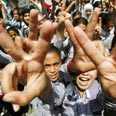
Ministerial committee: Ban Nakba Day
Government's Legislation Committee okays motion by Yisrael Beiteinu's Alex Miller to have marking of 'catastrophe of Israel's formation' banned by law, punishable by up to three years in jail. Arab MKs infuriated; call move 'insane'
The Ministerial Committee for Legislative Affairs on Sunday approved a motion barring the marking of Nakba Day.
"Nakba", or "catastrophe", is the term used to refer to the refugee flight of Palestinian Arabs that followed Israel's inception in 1948.
According to the motion, brought before the committee by Knesset Member Alex Miller (Yisrael Beiteinu), all public events which refer to the establishment of the State of Israel as a calamity will be prohibited by law.
Any infringement on the law would be punishable by up to three years in jail.
Miller's motion followed the violent events which took place during Nakba Day in 2008. It was initially brought before the committee during the last Knesset, but was put aside when the Knesset dispersed and new general elections were called.
"This is the first step in stopping the organized incitement by the Islamist Movement. Every democratic county has the right to defend itself and this is exactly what the State of Israel has chosen to do," Miller said.
Minister Michael Eitan (Likud), who voted against the motion, said that the motion "plays into the hands of our enemies… it will not be able to bar anything. The State of Israel has to be certain of its ability to fight against those who wish to ruin it, not by means of reducing freedom of speech, but by holding on to our beliefs. One has to remembers that the law already makes provision against incitement."
Balad Chairman Jamal Zahalka called the motion "crazy": "This is a crazy law by a crazy government. Passing a law that bans grief and mourning is an international precedent and an Israeli invention which indicates (moral) bankruptcy. We will find way to mark Nakba Day in spite of Netanyahu and Lieberman's insane government."
MK Afu Aghbaria (Hadash) slammed the motion as well: This suggesting is reminiscent of a Third Reich law. The Israeli government has declared a jihad on the Arab community and is slowly turning Israel to an apartheid state. I will not be surprised if the Netanyahu-Lieberman government will impose other restrictions on its Arab citizens, like barring the use of the Arabic language."
The motion will be put before the Knesset for a first reading next week. Should the Knesset decide to mature it into a bill, it would be referred back to the legislation committee for further drafting.
Sharon Roffe-Ofir contributed to this report










